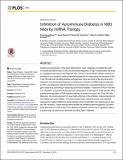Inhibition of Autoimmune Diabetes in NOD Mice by miRNA Therapy.
Author
Wang, Duncheng; Shanina, Iryna; Toyofuku, Wendy M.; Horwitz, Marc S.; Scott, Mark D.
Abstract
Autoimmune destruction of the pancreatic islets in Type 1 diabetes is mediated by both increased proinflammatory (Teff) and decreased regulatory (Treg) T lymphocytes resulting in a significant decrease in the Treg:Teff ratio. The non-obese diabetic (NOD) mouse is an excellent in vivo model for testing potential therapeutics for attenuating the decrease in the Treg:Teff ratio and inhibiting disease pathogenesis. Here we show for the first time that a bioreactor manufactured therapeutic consisting of a complex of miRNA species (denoted as TA1) can effectively reset the NOD immune system from a proinflammatory to a tolerogenic state thus preventing or delaying autoimmune diabetes. Treatment of NOD mice with TA1 resulted in a systemic broad-spectrum upregulation of tolerogenic T cell subsets with a parallel downregulation of Teff subsets yielding a dramatic increase in the Treg:Teff ratio. Moreover, the murine-derived TA1 was highly effective in the inhibition of allorecognition of HLA-disparate human PBMC. TA1 demonstrated dose-responsiveness and exhibited equivalent or better inhibition of allorecognition driven proliferation than etanercept (a soluble TNF receptor). These findings demonstrate that miRNA-based therapeutics can effectively attenuate or arrest autoimmune disease processes and may be of significant utility in a broad range of autoimmune diseases including Type 1 diabetes.
Date
2015
Citation:
APA:
Wang, Duncheng, & Shanina, Iryna, & Toyofuku, Wendy M., & Horwitz, Marc S., & Scott, Mark D.. (January 2015).
Inhibition of Autoimmune Diabetes in NOD Mice by miRNA Therapy..
,
(),
-
. Retrieved from
http://hdl.handle.net/10342/8089
MLA:
Wang, Duncheng, and Shanina, Iryna, and Toyofuku, Wendy M., and Horwitz, Marc S., and Scott, Mark D..
"Inhibition of Autoimmune Diabetes in NOD Mice by miRNA Therapy.". .
. (),
January 2015.
June 29, 2024.
http://hdl.handle.net/10342/8089.
Chicago:
Wang, Duncheng and Shanina, Iryna and Toyofuku, Wendy M. and Horwitz, Marc S. and Scott, Mark D.,
"Inhibition of Autoimmune Diabetes in NOD Mice by miRNA Therapy.," , no.
(January 2015),
http://hdl.handle.net/10342/8089 (accessed
June 29, 2024).
AMA:
Wang, Duncheng, Shanina, Iryna, Toyofuku, Wendy M., Horwitz, Marc S., Scott, Mark D..
Inhibition of Autoimmune Diabetes in NOD Mice by miRNA Therapy.. .
January 2015;
():
.
http://hdl.handle.net/10342/8089. Accessed
June 29, 2024.
Collections

